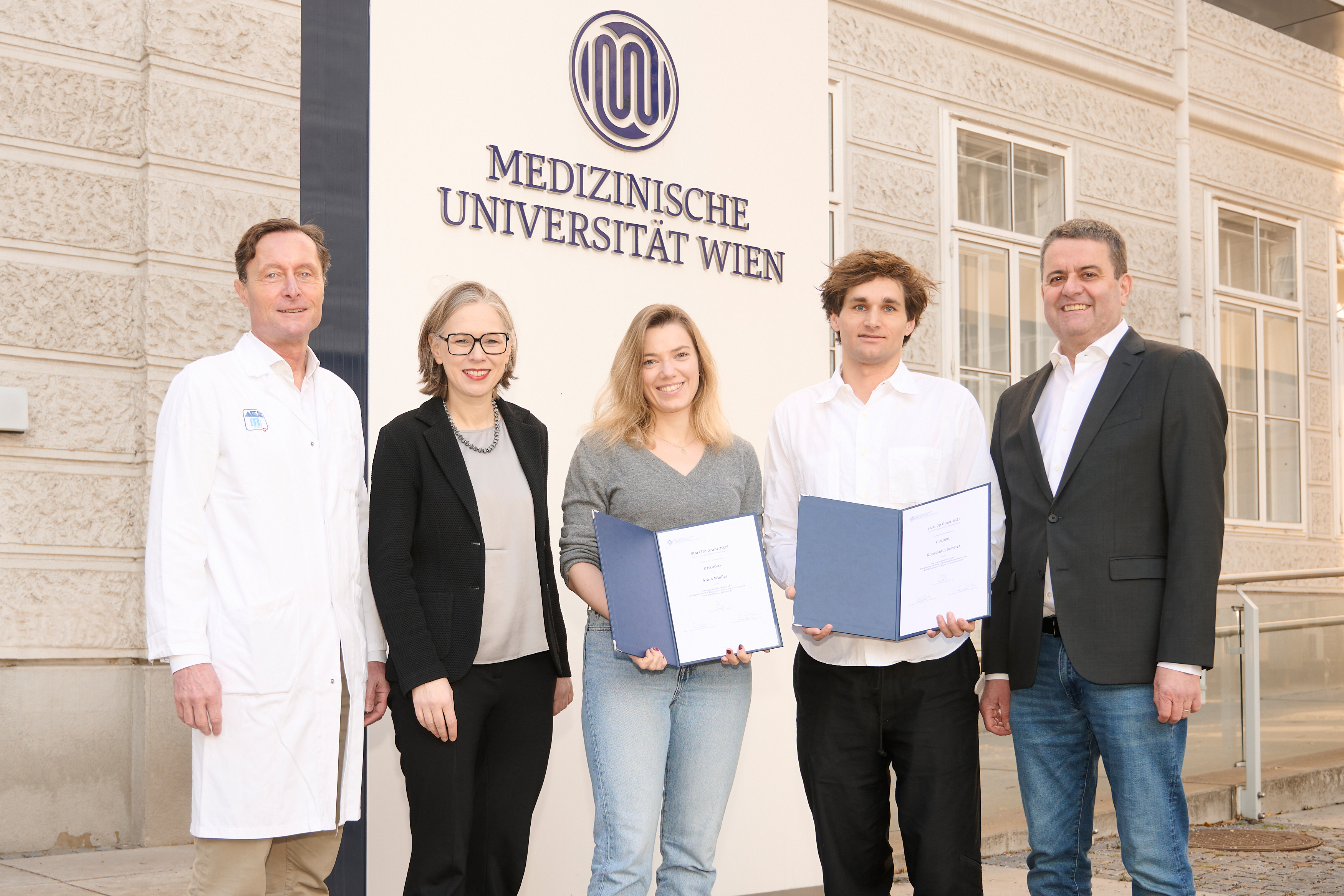Start-up Grants 2025: Anna Weijler and Konstantin Doberer

The Transplantation Research Platform of the Medical University of Vienna is awarding two “Start up Grants” to support young scientists in the field of transplant research. Anna Weijler and Konstantin Doberer receive funding for their projects on cell therapy and the microbiome.
The grants are intended to generate new research findings that will serve as the basis for future acquisition of third-party funding. The awards were presented by Michaela Fritz, Vice-Rector for Innovation and Research, and the coordinators of the Transplantation Research Platform, Rainer Oberbauer and Thomas Wekerle.
About Anna Weijler's project
Despite advancements in suppressing harmful immune reactions, general immunosuppression can lead to adverse effects, emphasizing the need for targeted tolerance strategies in the field of solid organ transplantation. The use of polyclonal regulatory T cells (Tregs) in transplant patients has shown to be safe and feasible, with early trials suggesting reduced infection rates, though their efficacy to induce tolerance remains to be demonstrated. Donor-specific Tregs, enhanced by genetic modification with chimeric antigen receptors (CARs), offer promise, with a HLA-A2-specific CAR construct already under clinical investigation. However, studies using HLA-A2 CARs in murine models face limitations, as they target a xenogeneic transgene rather than a native donor MHC, making them less representative of clinical settings.
This project focuses on evaluating CAR Tregs targeting a murine MHC antigen. We developed CAR Tregs specific to a donor-specific MHC class I antigen and already demonstrated their ability to recognize, activate, and suppress dono-specific responses in vitro. These CAR Tregs mimics the clinical setting more accurately representing a critical step toward advancing CAR Treg therapies. Using a footpad immunization model, we will assess their in vivo efficacy and explore their mechanisms of action in regulating donor-specific immune responses. Our findings will provide key insights into the potential of CAR Tregs in organ transplantation.
About Anna Weijler
Anna Marianne Weijler completed her MSc at the University of Vienna in Molecular Medicine (2017) and finished her doctorate at the medical university of Vienna in the thematic Programme for Organfailure, -replacement and Transplantation (POET) in 2024 for which she received a three-year DOC fellowship by the Austrian Academy of Sciences. As a PostDoc in Thomas Wekerles research group she researches the use of regulatory T cells in different transplantation settings.
About Konstantin Doberer’s project
The gut microbiome plays a central role in the regulation of natural digestive processes, the resistance of the organism to pathogens causing gastrointestinal (GI) infections, the absorption of medication and the tolerance of substances with GI side effects. These are central factors after kidney transplantation, as the use of immunosuppressive therapy is obligatory and a temporary over- or underdosing, a change in metabolism or even excessive, uncontrolled immune responses of the recipient can potentially lead to rejection episodes, which can negatively affect long-term organ survival and even lead to organ loss.
For the analysis of the intestinal microbiome, the change in the bacterial spectrum and count over time, depending on the current medication, the current diet and any infections that have taken place, is a clearly limiting factor. By using a new approach that records the body's own humoral immune response against the microbiome, a more stable picture of the microbiome can be drawn and will be investigated for its association with rejection and infections in the context of kidney transplantation.
About Konstantin Doberer
Konstantin Doberer completed his studies in human medicine at the Medical University of Vienna in 2017 and has been working at the Division of Nephrology and Dialysis at the Department of Internal Medicine III ever since. As part of his doctoral studies in the Program for Organ Failure, Replacement and Transplantation (POET), he is investigating new approaches to monitoring immune status after kidney transplantation under the supervision of Gregor Bond. During his time as a PhD student, he focused on the role of Torque Teno Virus (TTV) as an immunomarker after organ transplantation. His current research projects in the field of immune monitoring focus on the integration of recipient-specific factors such as metabolism, alteration of humoral immune responses and control of the donor's own microbiome for better risk stratification after kidney transplantation.
